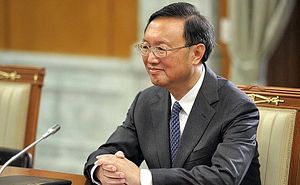On Monday, Chinese State Councilor Yang Jiechi arrived in Vietnam for a scheduled meeting with a broad-based agenda. Yang, who outranks China’s foreign minister, met with senior Vietnamese leadership, including President Tran Dại Quang and Vietnamse Communist Party General-Secretary Nguyen Phu Trong.
Yang’s visit is an instance of particularly high-level outreach to Hanoi before the Hague-based Permanent Court of Arbitration delivers a widely anticipated verdict on the status of various maritime features in the South China Sea in the case Philippines v. China.
In Vietnam, Yang was quoted by Chinese state media as having suggested that Vietnam and China “appropriately handle relevant disputes and problems.” Yang, the Vietnamese foreign ministry noted, discussed “controlling conflicts well, boosting negotiation mechanisms … and finding basic and long-term solutions that both sides can accept through peaceful exchanges and negotiations,” according to Reuters.
China has been engaged in a spate of international diplomacy ahead of the verdict, reaching out to countries near and far to seek their support for its position ahead of the upcoming verdict. Beijing has refused to participate in the tribunal’s proceedings or recognize the legitimacy of the case. Instead, Beijing has said that disputes in the South China Sea should be diplomatically address between the involved parties in a bilateral setting.
Vietnam and China have seen flare-ups over their own disputes in the South China Sea, which center mostly around the Chinese-occupied Paracel Islands. Woody Island, China’s most militarized South China Sea possession, home to surface-to-air missile systems and fighters, is in the Paracel Islands.
In the summer of 2014, China and Vietnam saw a major diplomat stand-off over Beijing’s placement of an oil rig in disputed waters. Incidents that year include widespread anti-Chinese protests in Vietnam and aggressive maneuvers against Vietnamese civilian boats by Chinese Coast Guard and fishermen alike.
In 2014, as The Diplomat discussed at the time, Yang Jiechi was one of the first Chinese envoys who traveled to Vietnam to mediate a draw down in tensions amid the 2014 crisis. At the time, Yang had “strongly advised Vietnam not to take legal action against China in the interest of repairing bilateral relations,” Carl Thayer wrote in The Diplomat.
So far, China’s diplomatic push for recognition of its position on the South China Sea hasn’t quite gone to plan, with just eight states having publicly come out in support of Beijing’s position. Yang’s trip to Vietnam was likely less about convincing Hanoi–a claimant and one with a fraught recent history with China–to come around on the South China Sea.
Rather, China wants to make it amply clear that Vietnam shouldn’t get any ideas in the wake of what is likely to be a favorable verdict for the Philippines at the Permanent Court of Arbitration and file its own legal proceedings. Yang had emphasized as much back in 2014 and his latest trip likely involved the reiteration of that message.

































